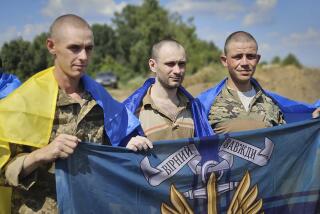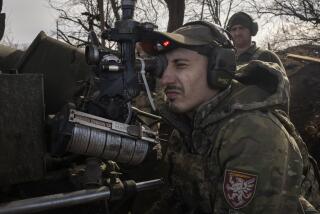Deal Clears Way for Russian Pullout From Lithuania : Military: Baltic state agrees to delay its demand for compensation. Most of remaining soldiers leave today.
MOSCOW — President Boris N. Yeltsin cleared the way Monday for an end to 53 years of Soviet and Russian military occupation of Lithuania in exchange for an indefinite delay in settling the Baltic nation’s demand for financial compensation.
Overcoming a 2-week-old snag in the timetable of troop withdrawal, the deal emerged from a telephone conversation between Yeltsin and Lithuanian President Algirdas Brazauskas on the eve of today’s deadline for completing the withdrawal, which had been set by the two nations last summer.
Lithuanian authorities announced that they would consider the deadline met when a trainload of Russian servicemen leaves the city of Kaunas late this afternoon and crosses into Russia, a milestone to be marked by an official celebration and fireworks in Vilnius, the Lithuanian capital.
After today’s scheduled withdrawal, 140 Russian troops will remain in Lithuania. About 100 of them will stand guard together with Lithuanian soldiers at Russian ammunition warehouses until the ammo is removed to Russia at the end of this year. The rest will supervise the legal transfer of Russian installations to Lithuania.
“For the first time in half a century, we can call ourselves a sovereign state,” Brazauskas declared. But he also conceded, “There have been compromises on both sides.”
Specifically, Yeltsin yielded to pressure from the United States to stick to the timetable, while Brazauskas stopped insisting on tying the pullout to an agreement by Moscow to pay for damage caused by the troops since the occupation of Lithuania in 1940.
Instead, the issue of compensation “will be discussed in the course of further negotiations,” starting with a meeting of the two presidents next month, according to a joint declaration issued Monday. Lithuanian officials admitted that the process could take years.
Lithuania and its Baltic neighbors, Latvia and Estonia, broke from the Soviet Union two years ago and made getting rid of Soviet troops their top foreign policy goal. As the Soviet Union collapsed at the end of 1991, its army, inherited by Russia, had about 122,000 troops and hundreds of installations in the three small countries.
About 30,000 Russian troops remain in Latvia and Estonia, and Moscow has yet to reach troop withdrawal agreements with those two nations.
As of two weeks ago, 2,400 Russian troops remained. Moscow halted their withdrawal Aug. 18, complaining that Lithuania had suddenly raised unreasonable demands for compensation.
In fact, compensation had been on the table since last year, when Lithuanians voted overwhelmingly to include the issue in negotiations. But their demands for billions of dollars for physical and ecological damage by Soviet troops and installations over half a century was criticized as unrealistic by European leaders. At the end, Lithuania was seeking to tie the troop withdrawal to an agreement committing Russia to pay some compensation for 20 months of occupation after the Soviet Union fell apart.
But even that aim was abandoned Monday after Yeltsin made it clear that no such agreement could be ratified by Russia’s current conservative legislature, the Supreme Soviet, officials close to the negotiation said. Instead of a formal agreement, the two nations are to sign an executive protocol today dealing with the end of the Russian presence.
Lithuanian leaders made it clear Monday that was their most important goal. With Pope John Paul II due here for a four-day visit starting Saturday, they were eager to show they had thrown off an occupying force.
“It is really a great relief, and one can’t but feel happiness and elation everywhere,” Pyatras Zapolskas, a Lithuanian Foreign Ministry official, said in a telephone interview Monday evening. “The republic is already celebrating.”
Sergei L. Loiko of The Times’ Moscow bureau contributed to this report.
More to Read
Sign up for Essential California
The most important California stories and recommendations in your inbox every morning.
You may occasionally receive promotional content from the Los Angeles Times.










